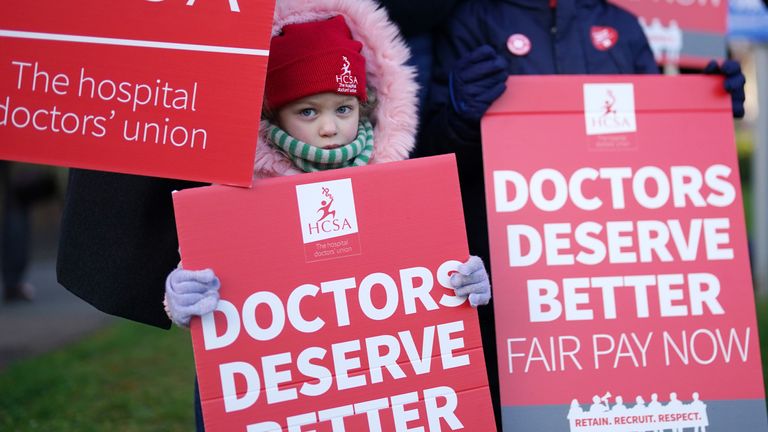UK economy flatlines with no growth in February as strikes hit productivity
The UK economy flatlined in February, with no growth in GDP, according to official figures.
Civil service strikes and low energy consumption offset growth in areas such as construction – which grew 2.4%, the Office for National Statistics (ONS) data showed.
The flatlining was unexpected. Economists polled by the Reuters news agency had forecast slight growth of 0.1% for the month.
ONS figures showed services production fell by 0.1% in the month, following growth of 0.7% in January 2023.
The largest contributor to negative growth in the services industry was education, which fell 1.7% in a month where teacher strikes took place.
Another strikes hit sector, public administration, was the second largest contributor to negative growth in the services industry.
Construction grew thanks to repair works taking place and retail output increased as many shops had a “buoyant month”, the ONS’s director of economic statistics, Darren Morgan said.
Unseasonably mild and dry weather led to reduced production of electricity and gas, Mr Morgan added. Output in the arts, entertainment and recreation industries grew, however.
It followed growth of 0.4% in January and confirmation the UK economy avoided recession in the second half of 2022 and actually grew 0.1% in the final three months of the year.
The most recent projections from the independent economic forecaster, the Office for Budget Responsibility (OBR), said the UK will avoid recession – defined as two consecutive quarters of negative growth – in 2023, despite previous predictions.
But the economy will still shrink overall this year by an expected 0.2%, and the fiscal watchdog warned living standards are to fall by the largest amount since records began.
Be the first to get Breaking News
Install the Sky News app for free



Read more:
Bank of England governor’s banking system warning
Why demand for cash is lowest for 20 years
All the Barclays branches closing in 2023
On a quarterly basis, the economy grew slightly. In the three months to February, the ONS said GDP, a measure of economic growth, increased by 0.1%.
However, responding to the flatlining, Chancellor Jeremy Hunt remained upbeat about the figures.
He said: “The economic outlook is looking brighter than expected – GDP grew in the three months to February and we are set to avoid recession thanks to the steps we have taken through a massive package of cost of living support for families and radical reforms to boost the jobs market and business investment.”
But Labour’s shadow chancellor Rachel Reeves criticised the government’s record on economic growth.
She said: “Despite our enormous promise and potential as a country, Britain is still lagging behind on the global stage with growth on the floor.
“The reality of growth inching along is families worse off, high streets in decline and a weaker economy that leaves us vulnerable to shocks.
“These results are exactly why Labour’s mission to secure the highest sustained growth in the G7 is so important – it’s that level of ambition that we need to strengthen our economy, get our high streets thriving again and make families across every part of Britain better off.”
The Bank of England’s chief economist said the flatlining economy was “somewhat disappointing” but was still a significant improvement from its previous forecast of a recession.
Huw Pill, speaking at a panel event with Market News International Connect, said: “Last summer we were forecasting a pretty deep, and certainly a very prolonged, recession in the UK.
“Relative to that, the flatlining of the economy that we are seeing, in terms of the evolution of GDP, is a quite significant improvement.”
